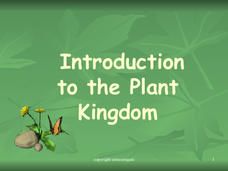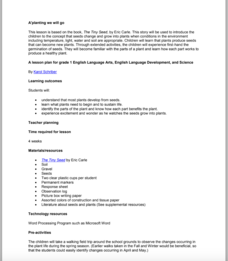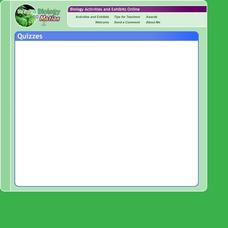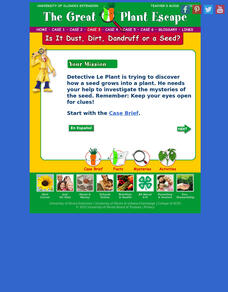The Science Spot
Flower Basics
Learn about plants and pollination with a worksheet about the parts of a flower. After labeling the anatomy of a flower using a word bank, kids explain the difference between self-pollination and cross-pollination, and unscramble...
Teacher Web
Plant Reproduction—Structure of a Flower
What happened to the plant in math class? It grew square roots. Here, a set of 11 worksheets provide a review of plant reproduction. It includes the structure of a flower and each part's function, pollination, fertilization, seed...
Rain Bird Corporation
Rain Forest Teaching Curriculum
Take young naturalists on an exploration of the world's tropical rainforests with this extensive collection of lessons and activities. Whether its creating leaf and flower prints or investigating the absorption spectrum of...
abcteach
Flowers for Algernon, by Daniel Keyes
Looking for materials to accompany your study of Flowers for Algernon, by Daniel Keyes? Look no further! Included here is everything you need to go alongside your unit: worksheets, graphic organizers, writing assignments, an assessment,...
Core Knowledge Foundation
Plants Tell It Again!™ Read-Aloud Anthology
A 190-page anthology explores the life and parts of plants, flowers, and trees while boosting reading comprehension skills. Literature and informational texts showcase Johnny Appleseed and George Washington Carver. Lessons...
Cornell University
Weed IPM
Go on a weed hunt! Scholars gain insight into the characteristics of plants and examine the outdoor environment in order to identify five different types of weeds. Learners then show what they know with a one-page reflection.
Columbus City Schools
You Can’t Sneeze On This Tissue
Take your class' understanding of cells to the next level... or levels! Demonstrate the levels of organization using a variety of engaging methods. The teacher's guide includes the materials you'll need to execute a flower...
Core Knowledge Foundation
A Time for All Seasons - Spring
Celebrate the arrival of spring with this fun primary grade science unit. Engaging young scientists with a variety of hands-on activities and inquiry-based investigations, these lessons are a great way to teach children about...
Biology Junction
Introduction to the Plant Kingdom
Plants provide humans with food, shelter, and medications. Scholars gain a better appreciation for plants after learning their functions, divisions, and early ancestors. Each sub-topic includes slides highlighting vocabulary and...
Curated OER
A'planting We will Go
Germination is an amazing process that results in amazing things. The book The Tiny Seed is the inspiration for a set of activities that will help build early literacy, observation, language, and writing skills. The class observes how...
Berkshire Museum
Adopt a Schoolyard Tree
Help young scientists connect with nature and learn about trees with a fun life science lesson. Heading out into the school yard, children choose a tree to adopt, taking measurements, writing descriptions, and drawing sketches of it in...
Allegany-Limestone Central School
Plantae WebQuest
Send your young life scientists on a plant webquest that has them reading case studies to decide if seeds are seeds and plants are plants.
Bethel School District
Observations and Inference
What's the difference between qualitative and quantitative observations? Learners make observations, inferences, and predictions about their environment with a set of questions and activities that are applicable to either language...
Curriculum Corner
Coniferous and Deciduous Trees
What are the differences between coniferous and deciduous trees? Supplement your tree lessons with a set of activities that has learners describing, naming, comparing, and reading about deciduous and coniferous trees. The activities are...
Kentucky School for the Deaf
Levels of Organization within an Ecosystem
From tiny organisms to entire biomes, young scientists examine the interdependent relationships tying all living and non-living things together with this collection of ecology resources.
Biology in Motion
Organize-It
Many pupils struggle to categorize and organize related content. Multiple quizzes on a variety of topics offer practice for these specific skills. Scholars move items around until they think each is placed in the proper position....
Biology Junction
Introduction to Plants
In this biology lesson, learners identify the different types and parts of the plant. They complete a crossword puzzle with 37 questions about plants.
American Chemical Society
Isolation of Phytochrome
Why do soybean plants that are planted weeks apart in the spring mature simultaneously in the fall? Four independent activities cover the history of phytochrome research, scientist collaboration, the electromagnetic spectrum, and...
Casimir Middle School
Biological Classification Worksheet
Classify living things with a set of worksheets that has pupils sorting and indentifying living and non-living things. Learners use the worksheets as a basis for finding their answers.
Curated OER
Bee Pollen Popular
The world would be a much different place without the help of pollinators. Read about the important role bats, hummingbirds, and various insects play in plant reproduction, exploring the interdependence of living things in an ecosystem....
Scholastic
Scholastic: Study Jams! Science: Plants: Flowers
A video and a 7-question multiple-choice quiz on the structure and functions of flowers.
University of Illinois
University of Illinois Extension: The Great Plant Escape Parts of a Seed
Help Detective Le Plant discover how a seed grows into a plant. Students will learn to describe a seed's structure and what's needed for seed growth.
E-learning for Kids
E Learning for Kids: Science: Iceland: Plants: What Parts Do Plants Have?
Explore Benny's garden, and he will show how plants and trees are built. Join him to to learn about basic plant parts.
E-learning for Kids
E Learning for Kids: Science: Norway: What Are the Functions of Different Parts of a Plant?
Heidi is going on a class trip with her class in Norway. Help her learn the functions of different parts of the plants found.























